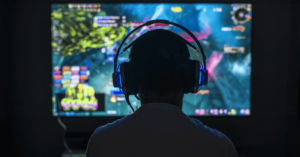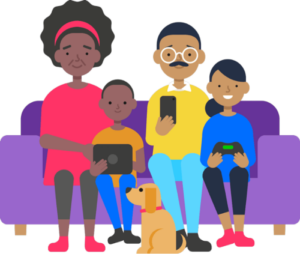In 2019, the global games market was worth $152 billion. With growing concerns about the amount of time children and teenagers spend playing online games and the impact it can have, Psychotherapist Jason Shiers, shares his insight on gaming addiction in children.
Summary
81% of under 18s regularly play online games and in moderation, gaming can be fun, sociable and interactive with opportunities for children and young people to learn and solve problems. Most will not experience any harm but there are known impacts of gaming addiction in children you need to be aware of:
- Gaming addiction and financial concerns
- Effects of gaming addiction on education and personal growth
- Social relationships
- Gaming addiction effect on mental health
- Effects of gaming on physical health
- Tips to combat bad gaming habits in children
- More resources to support children
Gaming addiction and financial concerns
Games that have in-app purchases to buy ‘tokens’ or ‘passes’ could possibly lead to children running up unexpected credit card bills for parents and carers.
To access games, many platforms or developers require credit card details sometimes even for free downloads. Unless sufficient parental controls are set up – for example, password protection, spending restrictions, and alerts, separate accounts for children or unlinking credit cards from the child’s device – then parents can be stung with big bills for in-game purchases.
- What are in-game and in-app purchases? Although many games are free-to-play, they also include premium features that you have to pay for to access. These could include certain characters, points or virtual currency. So children may use real money in the game to buy these items to enhance their gameplay or progress further in the game.
- Can you get a refund for unauthorised in-game purchases? If your child accidentally spends too much on in-game purchases getting a refund depends on the terms and conditions of the gaming platform or game developer. It’s not always possible to claim the money back – including in cases where parental controls aren’t set up properly.
- One of the biggest gaming sensations, Fortnite, does offer refunds for unauthorised purchases by children – but there’s a limit on how many times they will do this. Other platforms and developers are much less flexible.
- What are loot boxes and what are the risks for children? Loot boxes unlock special features, characters or items in a game. However, they come with a fee and players do not know what’s inside until they have paid. So, you could receive items you really want or nothing of use. Loot boxes have been criticised globally for promoting underage gambling and encouraging multiple purchases.
In the UK, there have been calls to ban the sale of loot boxes to children. - Getting into debt – If parents can’t get a refund for unauthorised purchases, they can find themselves with a large debt that is accumulating interest.
Sometimes parents insist that their child pays back the debt – including by docking pocket money, reducing spending on other treats or by asking teenagers for contributions from earnings.
Children and young adults can also run up large debts from gaming – including students with first-time access to loans and credit cards. - Legal issues – In extreme cases, parents have reported their children to the police for ‘friendly fraud’. This is usually when they have been unsuccessful in getting a refund for in-game purchases. Although rare, this puts young people at risk of being questioned by the police and even criminalised.
Effects of gaming addiction on education and personal growth
Implications of excessive gaming may result in harmful effects on children’s education and wellbeing.
- Interference with studies – One of the signs of gaming addiction is the impact on other areas of life. If school work is suffering – including boredom in lessons, difficulty concentrating or low motivation to complete homework – then their gaming habits should be assessed.
- Exposure to violent, graphic or sexualised content – Ofcom found that increasing numbers of parents are concerned about the content of games they play. This includes 25% of parents of 3-4-year-old gamers (compared to 10% in 2017).
Most major titles do come with age guidance but as with films or TV shows, many children access the content at a younger age. Fortnite, for example, is rated 12+ – yet many primary school-age children play.
Games with violent, sexualised or highly realistic content (including augmented reality and virtual reality games) can also have an emotional impact on children, especially the younger kids. It’s a controversial area with conflicting research but a study from Science Daily has linked violent video games to aggression in young people.
Social relationships
If gaming is at the expense of connection with friends in real life, then this withdrawal can affect relationship skills in everyday situations.
Gaming can be a social activity. Whether playing with siblings on a console or competing with friends online, there are benefits for social development in gameplay. Increasingly, children and young people are playing games online. In 2018, Ofcom found that three-quarters of 5-15-year-old gamers only ever play online – up from two-thirds in 2017.
Gaming addiction effect on mental health
All of the following elements can indicate gaming addiction. These symptoms tend to be more pronounced when children or young people are not gaming – including if they are prevented from playing.
- Anger or rage – If a parent interrupts a gaming session or broadband goes down, what is the reaction? If children or young people respond with anger or rage – including shouting, screaming or physical attacks, then this is something worth noting.
- Compulsivity – Is there a strong sense of urgency to get back to gaming? Is it difficult to pull yourself away? With children and young people, compulsive play can manifest in playing past switch-off times, late at night or secretively.
- Isolation and loneliness – If children spend long periods of time playing games by themselves, this reduces interaction with relatives and friends in real life.
Though many young gamers use online chat in multiplayer games, including to talk to friends in real life – this should be balanced with interactions in the same physical space. - Depression – In regular gamers, ongoing listlessness, sadness or lethargy can be signs of problem gaming. Depressive symptoms will be most apparent when they are not playing the game – i.e. in the withdrawal phase.
Effects of gaming addiction on physical health
Excessive gaming repeatedly over long periods can potentially cause physical strain on gamers.
- Repetitive strain injury (RSI) – Children and young people who play games for extended periods can be affected by RSI. Stiffness, aches, pain and numbness are signs to watch out for. For example, ‘nintendinitis’ refers to thumb, wrist and hand problems associated with playing on gaming consoles. Eye strain is also common if you look at screens for long periods without taking breaks. Screen glare can also affect vision.
- Poor posture – If you’re slouching in a chair or you’re hunched over your mobile, then it’s time to take a break. Whilst these positions won’t harm most children immediately, they can lead to serious problems in adulthood.
- Headaches and migraines – Headaches may be related to physical causes such as eye strain, bad posture or dehydration. Or they may be related to mental health issues – including anxiety and depression. Young gamers who get regular headaches should get checked out by a doctor.
- Lack of physical activity – Playing sedentary games for long periods can mean that people miss out on exercise. The World Health Organisation recommends that children and young people, aged 5 to 17, do at least 60 minutes of activity per day.
- Poor nutrition or self-care – When gaming addiction takes over, children and young people may skip meals, rely on junk food, resist taking toilet breaks or have poor hygiene.
- Poor quality sleep – Playing stimulating games for many hours at a time, particularly late at night, will make it harder to get to sleep.
Tips to combat bad gaming habits in children
It’s understandable to believe that if you can get your child’s gaming under control, then everything will return to normal. However, every addiction is best understood as a symptom rather than the problem. For this reason, telling your child to reduce their gaming, punishing them for breaking rules or restricting their access to devices, probably won’t solve their difficulties permanently.
The key to real change is this – what is so distressing or unsatisfactory about your child’s life when s/he is not gaming? To overcome gaming addiction, your son or daughter will need help to discover the answers to this question, as well as learning how to cope in healthier ways.
Of course, it’s an important step for your child to acknowledge the consequences of harmful gaming, including how health, relationships, education and finances are affected – but this is only the start. Lasting recovery from gaming disorder comes through awareness and emotional resilience. Your child needs to know how to recognise and handle emotional distress including when they crave game play.






